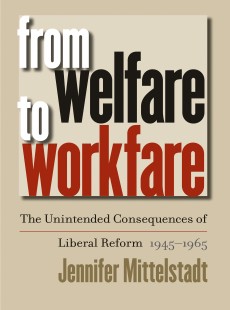
From Welfare to Workfare
The Unintended Consequences of Liberal Reform, 1945-1965
Jennifer Mittelstadt
 Publisher: University of North Carolina Press
Publisher: University of North Carolina Press
Imprint: The University of North Carolina Press
Published: 03/2006
Pages: 288
Subject: Political Science, History, Social Science
| University of North Carolina
Print ISBN: 9.78E+12
eBook ISBN: 9780807876435
DESCRIPTION
Mittelstadt examines the dramatic reform of Aid to Dependent Children (ADC) from the 1940s through the 1960s, demonstrating that in this often misunderstood period, national policy makers did not overlook issues of poverty, race, and women's role in society. Liberals' public debates and disagreements over welfare, however, caused unintended consequences, she argues, including a shift toward conservatism. Rather than leaving ADC as an income support program for needy mothers, reformers recast it as a social services program aimed at "rehabilitating" women from "dependence" on welfare to "independence," largely by encouraging them to work. Mittelstadt reconstructs the ideology, implementation, and consequences of rehabilitation, probing beneath its surface to reveal gendered and racialized assumptions about the welfare poor and broader societal concerns about poverty, race, family structure, and women's employment.



